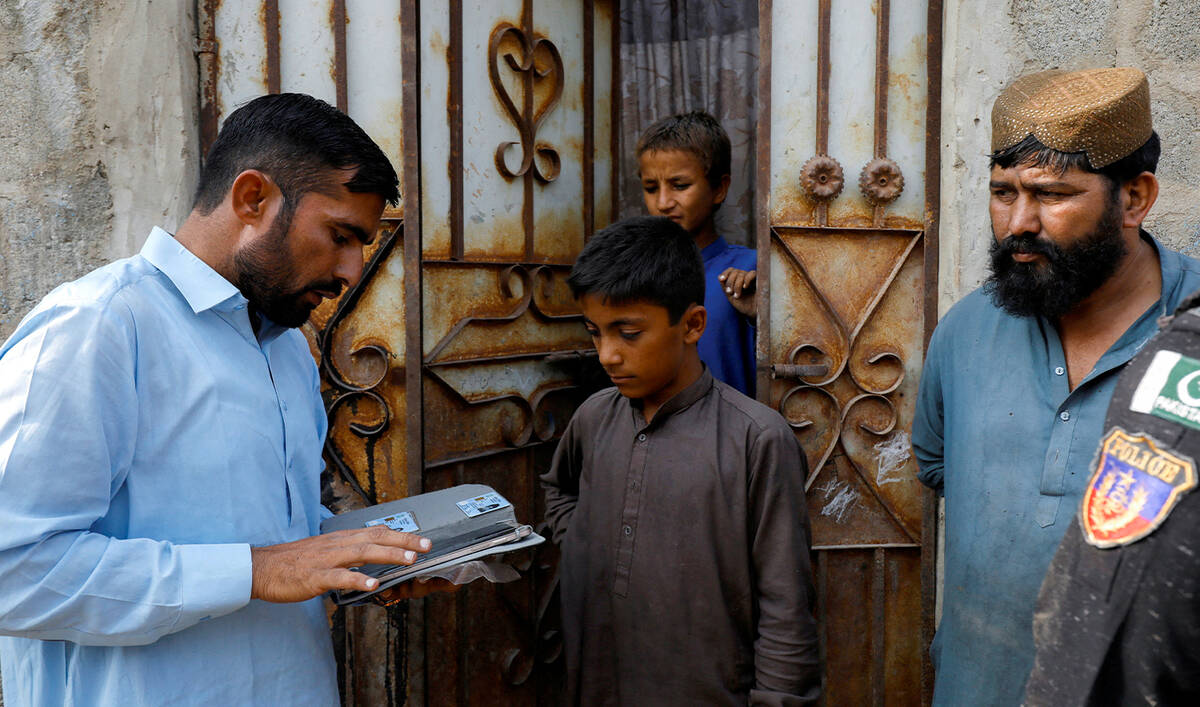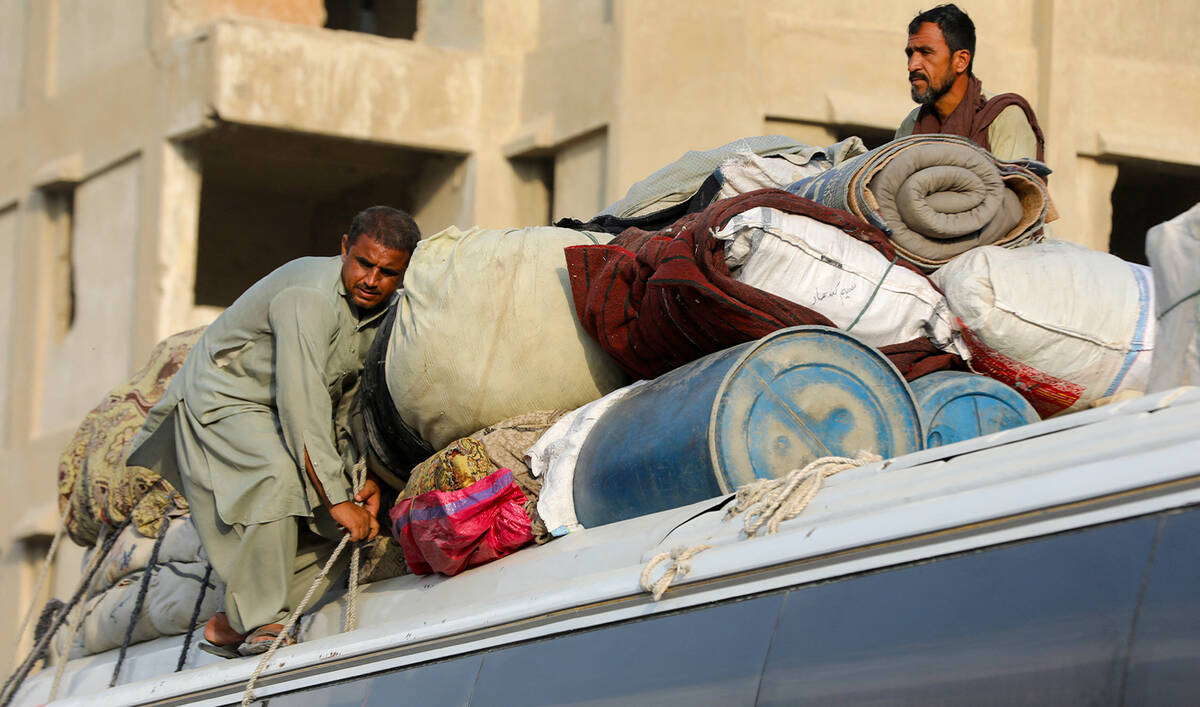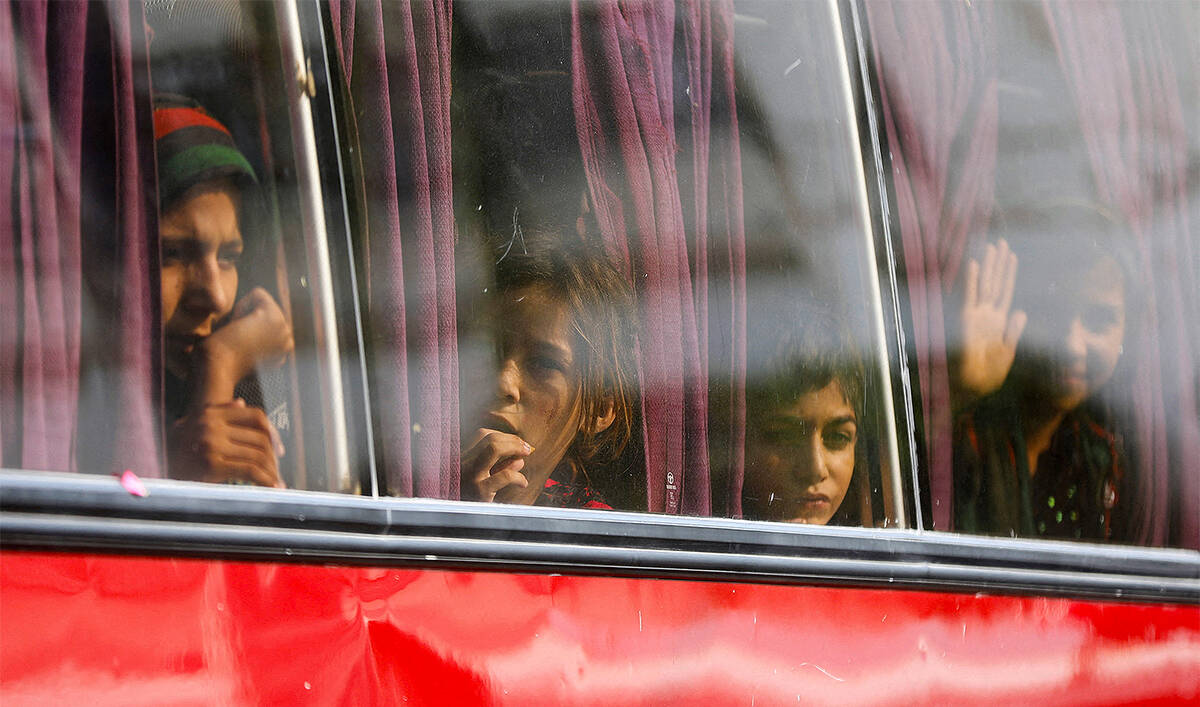KARACHI:┬ĀUntil last year on the days before Eid Al-Fitr, the home of Zahra Arif, 20, used to be filled with laughter and the aroma of kulcha, qatlama, beef pulao and other traditional foods being prepared in anticipation of the religious holiday.┬Ā
This year, the small apartment in which the family of ten lives on the outskirts of PakistanŌĆÖs megacity of Karachi was quiet and the air was tense. They are Afghan Citizen Card (ACC) holders, refugees granted temporary legal status in Pakistan in 2017 but whom the government ordered earlier this month to leave before Mar. 31 or face expulsion ŌĆö a date that coincides with the first day of Eid this year.┬Ā
ŌĆ£We havenŌĆÖt made any preparations for this Eid because the situation is uncertain,ŌĆØ Arif, who was born and raised in Karachi and whose family has lived there for 35 years, told Arab News.
ŌĆ£They are expelling Afghans so who would feel like making new clothes for Eid?ŌĆØ
The move is part of a larger repatriation drive of ŌĆśillegal foreignersŌĆÖ that began in 2023, with over 884,261 Afghans expelled from Pakistan since, according to government figures. Authorities initially said they were first focusing on expelling foreigners with no legal documentation and other categories like ACC holders would be included later.
More than 800,000 Afghans hold an ACC in Pakistan, according to UN data. Another roughly 1.3 million are formally registered with the Pakistan government and hold a separate Proof of Residence (PoR) card, launched in 2006 to grant legal recognition and protection to Afghan refugees. In total, Pakistan has hosted over 2.8 million Afghan refugees who have crossed the border during 40 years of conflict in their homeland.

A worker from the National Database and Registration Authority (NADRA), speaks to Afghan citizens while verifying their identity cards on an online tab, during a door-to-door search and verification drive for undocumented Afghan nationals, in an Afghan Camp on the outskirts of Karachi, Pakistan, on November 21, 2023. (REUTERS/File)
Islamabad has in the past blamed militant attacks and crimes on Afghan citizens, who form the largest portion of migrants in the country. The government says militants, especially from the Pakistan Taliban (TTP), are using safe havens in Afghanistan and links with Afghans residing in Pakistan to launch cross-border attacks. The ruling administration in Kabul has repeatedly rejected the accusations.
The latest deadline has left the nearly 800,000 ACC holders, including an estimated 65,000 in Karachi, grappling with the prospect of a forced return to a country many have never even visited.┬Ā
ŌĆ£We have been living here for 30 to 35 years, how will we survive there,ŌĆØ said Arif, whose family comprises her parents, two brothers, five sisters, and herself. ŌĆ£There is no place for us there, no home, nothing.ŌĆØ
ŌĆ£EID HAS TURNED INTO POISONŌĆØ
Arif also has other worries.┬Ā
She fears for the career and higher education prospects for herself and her five sisters in Afghanistan, where over three years of Taliban rule has led to the ŌĆ£strikingŌĆØ erasure of women from public life, according to the UN.┬Ā
Afghanistan is the only country in the world where secondary and higher education is strictly forbidden to girls and women. According to UNESCO data published last year, 1.4 million Afghan girls have been deliberately deprived of schooling. Access to primary education has also fallen sharply, with 1.1 million fewer girls and boys attending school.
Since the Taliban took power in 2021, professional opportunities for women have also been severely restricted. Many women lost their jobs and others were only allowed to continue if they worked from home. Any woman who still has a job has to be accompanied on their journey to work by a male relative.┬Ā
Arif, who completed her high-school in Karachi, had dreams of pursuing a career in IT but now believes all her efforts were in vain.
ŌĆ£I have taken computer courses and was thinking of doing a freelancing course but how will I do that there?ŌĆØ she asked. ŌĆ£The twelve years of education I completed here, my intermediate degree, everything will be useless there.ŌĆØ

Afghan┬Āmen load their belongings as they head back to┬ĀAfghanistan, after Pakistan gave a final warning to undocumented immigrants to leave, at a bus stop in┬ĀKarachi, Pakistan, on November 4, 2023. (REUTERS/File)
Idrees Khan, a 25-year-old Afghan refugee who was born in Pakistan and sells French fries at a roadside stall, also wondered what he would do in Afghanistan, a country he has never visited and where he had heard there were few jobs and future prospects.┬Ā
ŌĆ£For us, Pakistan has always felt like our country but now, on Eid, they are telling us to leave. This is distressing,ŌĆØ he said. ŌĆ£If they had given us some time to process and prepare, it would have been better for everyone. But forcing us to leave now is inappropriate.ŌĆØ
Hajji Abdullah Shah Bukhari, a community elder who represents Afghan refugees in the southern Sindh province, said he was ŌĆ£still in shockŌĆØ over the governmentŌĆÖs decision to expel ACC holders.
ŌĆ£Pakistan has hosted Afghan refugees for 47 years and we are grateful for this hospitality, but the recent announcement of expelling us is heartbreaking.ŌĆØ┬Ā
The governmentŌĆÖs decision was taking an ŌĆ£emotional tollŌĆØ on the community ahead of the Eid holiday, the community leader said.┬Ā
ŌĆ£A year ago, around this time, people would be buying clothes and essentials for their children to celebrate Eid,ŌĆØ he said. ŌĆ£But now, if you look inside any Afghan household, you will see people shedding tears of blood, wondering what to do.ŌĆØ
Bukhari urged Islamabad to reconsider its policy and engage with Afghan authorities on any issues between the two governments.┬Ā
ŌĆ£Why doesnŌĆÖt the Islamic Republic of Pakistan negotiate with the Islamic Emirate of Afghanistan?ŌĆØ he asked. ŌĆ£Afghan refugees are not involved in the policies of either Afghanistan or Pakistan. We have always remained away from politics, but what is happening to us now is injustice.ŌĆØ

Afghan┬Āchildren look out from the bus window as they are being repatriated to┬ĀAfghanistan along with their families, who according to police were undocumented and detained at a temporary holding centre, after Pakistan gave the last warning to undocumented migrants to leave, in┬ĀKarachi, Pakistan, on November 2, 2023. (REUTERS/File)
The United Nations High Commissioner for Refugees (UNHCR) also expressed concerns.
ŌĆ£We have seen and are aware of the [Pakistani] governmentŌĆÖs plans regarding ACC holders,ŌĆØ Qaiser Khan Afridi, a UNHCR spokesperson in Pakistan, told Arab News.
ŌĆ£UNHCR is concerned regarding the latest directive, as among the Afghan Citizen Card-holders there may be individuals requiring international protection.ŌĆØ
Afridi called for a humanitarian approach and urged dialogue between Pakistan and Afghanistan:┬Ā
ŌĆ£It is imperative that returns are voluntary and dignified so that reintegration in Afghanistan is sustainable.ŌĆØ
A statement from the government on Sunday said ŌĆ£no mistreatment will occur during the [repatriation] process,ŌĆØ adding that arrangements had been made for food and health facilities for those returning.┬Ā
But amid the fear and uncertainty, Gul Jan, a 53-year-old refugee with 11 children and an ailing husband, pleaded for compassion from the authorities.┬Ā
ŌĆ£This Eid has now become a sorrow for us, it has turned into poison,ŌĆØ she said. ŌĆ£But if the governmentŌĆÖs word changes now, then any regular day will be Eid for us.ŌĆØ
















